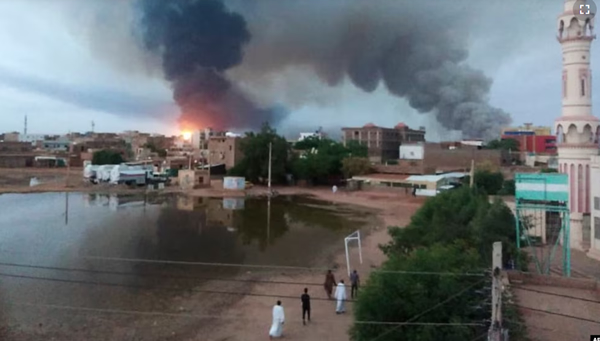
Heavy clashes resumed Wednesday morning between Sudan’s military and the Rapid Support Forces in and around Sudanese capital, Khartoum, after a 72-hour cease-fire expired.
As the three-day truce elapsed early Wednesday, the sounds of gunfire and artillery could be heard in Khartoum and its sister city, Omdurman, sparking renewed fear among civilians.
Khartoum resident Ammar Hassan reported hearing gunshots around the department of military engineering, an army-controlled building the Rapid Support Forces have tried to take several times without success.
Hassan said fierce confrontations erupted this morning in the south of Omdurman — specifically around the engineering department. He said the attack could be heard coming from Fetihab, Um Baddah El Mansura, Al Doha and Abbasia, among others.
Sudan’s army and the Rapid Support Forces have been fighting for more than two months, inflicting destruction on the capital, causing extensive violence in Khartoum and also in the western region of Darfur.
More than 2.5 million people have fled their homes, according to the United Nations.
The three-day cease-fire brought a rare lull in the fighting, and residents of Khartoum and Omdurman were able to leave their homes and find food.
But Manal Osman, a resident of the Saleha neighborhood south of Omdurman, said as the fighting intensified, basic commodities were running out again and families were unable to access basic services.
Osman described the situation as “horrible.” Some residents are trying to leave, he said.
He said people continue to travel outside the city in large numbers, while there are those who stay behind, and life for them seems to be normal.
South of Khartoum, witnesses reported that army aircraft carried out airstrikes on RSF troops stationed in the Olympic Stadium.
Mohammed Abdallah, who resides in the Mayo neighborhood south of Khartoum, said at least one bomb hit a house in the al-Andalus area.
He said a block of the al-Andalus neighborhood in Khartoum was hit by a bomb. It did not kill anyone, he said, because it fell on an empty house.
Hassan said that as the two warring parties continue battling, health care is getting increasingly difficult to find.
He said civilians and sick people are facing difficulties in accessing health facilities. He estimated that more than 60% of the area’s health centers are located in and around the fighting area and they are out of service.
Meanwhile, there also were unconfirmed reports of clashes in the Delenj region of South Kordofan state, between the army and a rebel group, the Sudan People’s Liberation Movement North or SPLM-North, a faction led by General Abdulaziz Al Hilu.
Source: voanews.com























